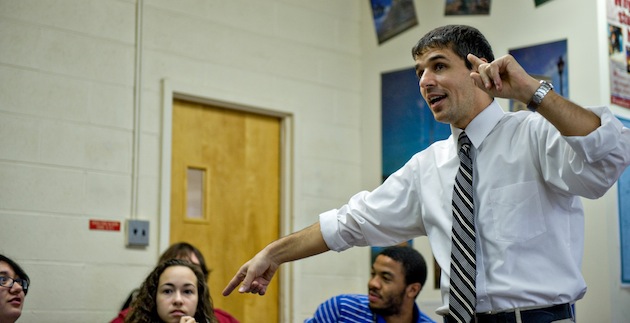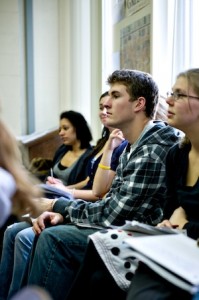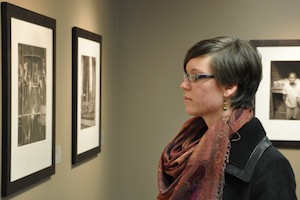
[dropcap3]A[/dropcap3]t Philadelphia Biblical University we believe that the student’s calling is fulfilled in service to the Lord Jesus and in obedience to His Word. The path set before them is to love God with all their being and particularly as students to love Him with their minds. As part of their first year experience, we want our students to understand that there is no separation between their spiritual life and their academic life. From the beginning we guide our students to a commitment that all their studies at PBU constitute their spiritual service of worship. We accomplish this in a course titled Student’s Life and Calling.
What is Student’s Life and Calling? As our freshmen glance through their schedules before the semester begins, it is a question they often ask. Students who have already taken the course usually smirk, recalling their own curiosity when they arrived on campus. Here are some of the similes that students furnished at the end of the course: Student’s Life and Calling is like: an unfinished piece of art, music to my ears, a shoe horn, the horizon, a roller coaster, a seed, and Thinking 101.
 How do students come to these conclusions? It begins during the first week of class when students are asked seemingly simple questions: What does it take to have a quality conversation? What is required of the speaker? What about the listener? Why are conversation and discussion valuable assets to learning? What does it mean to be in a learning community? What does it mean to be a student? What does it mean to learn? Perhaps you can understand the intellectual whiplash this may cause new students, who may be thinking, “I thought I was here to get a degree, maybe a certification for a profession, and to learn about the Bible.” By week three, we have begun the “different path” because the answers to these questions typically conflict with the ethos and motives of the world of academia and society at large.
How do students come to these conclusions? It begins during the first week of class when students are asked seemingly simple questions: What does it take to have a quality conversation? What is required of the speaker? What about the listener? Why are conversation and discussion valuable assets to learning? What does it mean to be in a learning community? What does it mean to be a student? What does it mean to learn? Perhaps you can understand the intellectual whiplash this may cause new students, who may be thinking, “I thought I was here to get a degree, maybe a certification for a profession, and to learn about the Bible.” By week three, we have begun the “different path” because the answers to these questions typically conflict with the ethos and motives of the world of academia and society at large.
Since implementing the course, we’ve observed changes caused by Student’s Life and Calling; the students’ enthusiasm for learning and scholarship is noticeably rekindled or even set ablaze. The campus culture is changing, as increasing numbers of students can be found reading books for pleasure or joining several of the homegrown book clubs at the University. Students have started a film and discussion club. After class, in the dining commons, or even in their dormitories, students are joining the Great Conversation as part of an extension of class. Students are e-mailing their professors with links to articles, news stories, books, music, and documentaries that relate to the subject matter in order to further the thinking and conversation.
In his book, A Mind for God, J.E. White explains not only how to move past the usual extrinsic marks of learning and to also reach an understanding of truly exercising our God-given minds. He reminds us that since we have been created with minds we must, to the glory of our creator, exercise them. This means grappling with ideas that challenge what we already know and extending our field of understanding. All of these topics are also addressed throughout the semester. Thinking is not reacting to an issue, explaining how you feel about an idea, or even quoting a biblical text regarding a certain topic. True thinking requires both a framework and a logical process. We practice this approach as we introduce the essential questions of humanity: Who are we? Why are we here? What is the purpose of life? Who is God? What is art? What is beauty? As a class, we observe, discuss, and wrestle with the answers to these questions. We learn to see how others have answered them as we flesh out an understanding of ourselves and our calling as Christians that we had never actually thought out before. With a fresh understanding of the life of the mind and its exercise, these students are embarking on a lifelong journey into scholarship for the glory and honor of their divine Schoolmaster.
[blockquote align=”left”]
True thinking requires both a framework and a logical process.
[/blockquote]
This study offers us a bridge to provide the rationale for courses from the School of Arts and Sciences. What is the purpose of studying psychology, sociology, literature and the arts, ancient history, and philosophy when you have decided to attend a biblical university? To further understand this we encourage our students to begin to think from an integrated or interdisciplinary approach. When one thinks about an issue, one should cross over between academic disciplines in order to fully explore what is at hand. For example, the implications of innovations such as the printing press, the compass, and the assembly line or events like the purchase of the Louisiana Territory, the construction of the Suez Canal, or the 9/11 attacks were political, social, economic, scientific, artistic, theological, philosophical, geographical, technological and so on. This is just the beginning!
Taking this thinking one step further, each of the consequences also had ramifications that could be felt across the spectrum of disciplines. When the students realize that “everything is connected to everything,” they begin to appreciate the relevance and complexity of ideas since they are no longer just unrelated facts or ideas to be studied to pass a test. The result: a deeper appreciation and a bona fide excitement for genuine learning from a biblical perspective.
As professors of this course it is a real joy to observe the beginning of this transformation. They begin to wonder, “If everything is connected to everything, and theology is one of those things, when we study science, are we actually studying facets of God? Of course we are! God made the stuff of science.” Creation reflects its Creator—in studying science, whether it is biology, botany, astronomy, genetics, or the environment, we come to understand God in a truer, deeper way. His order, faithfulness, and appreciation of creativity are written all over his creation. Imagine the possibilities when we apply these same principles to Romantic literature, Baroque music, Surrealist art, medieval history, scholastic philosophy, Newtonian physics, Constitutional law, cultural anthropology—all academic topics and disciplines. In short, we, as students, go to class, do homework, and study not to get a degree but because when we do so, we learn about and glorify our Creator.
[framed_box]Brenda Ebersole, M.Litt., is an Assistant Professor in the School of Arts and Sciences. She has taught at PBU since 2006.
[/framed_box]
[framed_box]Chris Palladino, M.Ed., is an Assistant Professor in the School of Education and the Director of the Secondary Social Studies Education program. He has taught at PBU since 2006.
[/framed_box]